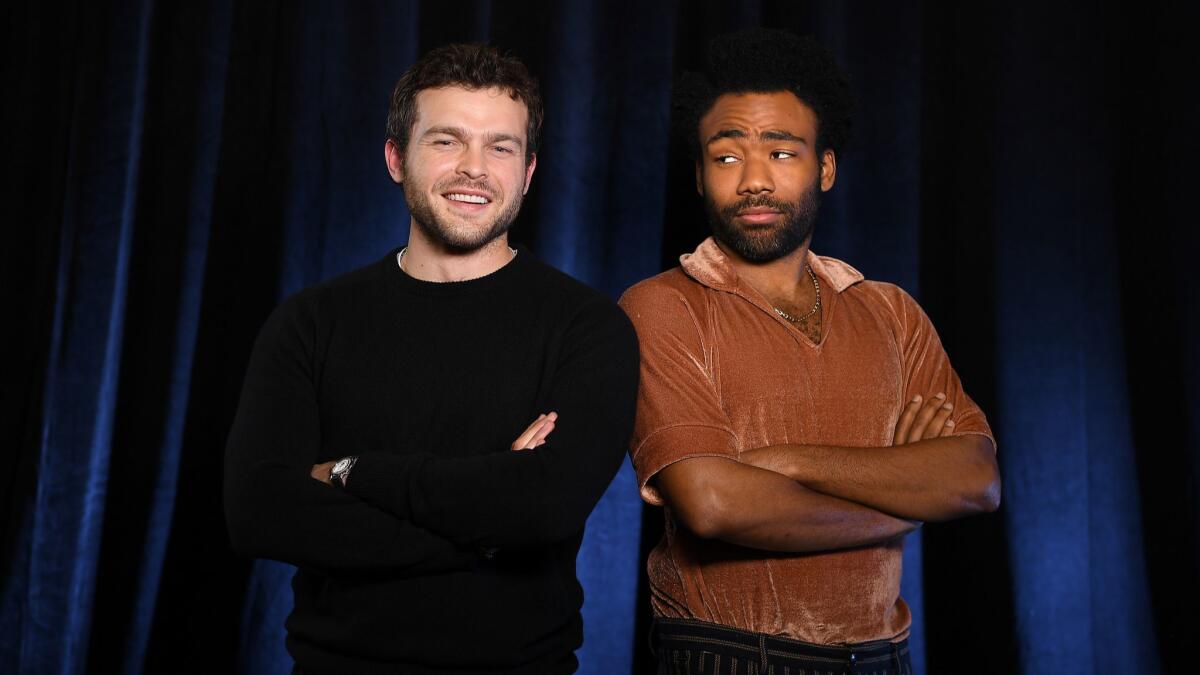‘Solo: A Star Wars Story’ duo Alden Ehrenreich and Donald Glover breathe new life into beloved characters
- Share via
It’s always daunting to take on a character that’s been memorably played before by another actor. But stepping into an iconic role in a “Star Wars” movie? As Han Solo would say, “Never tell me the odds.”
In the new “Star Wars” spinoff film “Solo: A Star Wars Story,” in theaters May 25, Alden Ehrenreich plays a younger version of Harrison Ford’s swaggering, swashbuckling smuggler in an adventure set years before the events of the original trilogy. Directed by Ron Howard, who stepped in after the original directors, Chris Miller and Phil Lord, were fired midway through production, the film is a cross between a heist movie and a space western, chronicling Solo’s first encounters with his Wookiee sidekick, Chewbacca, the Millennium Falcon and his stalwart frenemy, the smooth-talking gambler Lando Calrissian, who was introduced in 1980’s “The Empire Strikes Back” by Billy Dee Williams and who is played in “Solo” by actor-writer-musician Donald Glover.
“Solo” marks the first venture into the blockbuster realm for Ehrenreich, 28, who has appeared in such films as “Rules Don’t Apply” and “Hail, Caesar!” Glover, 34, created and stars in the acclaimed FX series “Atlanta,” which recently finished its second season, and has appeared in movies like “The Martian” and “Spider-Man: Homecoming.” As his musical alter ego Childish Gambino, Glover is currently riding the top of the Billboard charts with his zeitgeist-tapping hip-hop song “This Is America,” the video for which has become a viral sensation.
On a recent afternoon, Ehrenreich and Glover spoke with The Times about their own formative “Star Wars” experiences, the sometimes bumpy production of “Solo” and the thrill and challenge of taking on two of the most famous characters in this or any other galaxy.
You guys are both too young to have seen the original trilogy when the movies came out. So what were your ways into “Star Wars”?
Glover: My dad. All of the original movies had already come out but he would talk about the lore of it: “When this came out, I waited in line and da-da-da…” It was such a big part of his life. Then when “Episode I” came out, it was great because it was like getting to do that all over again – he pulled me out of school to go see it and we waited in line for tickets and dressed up.
Ehrenreich: When I was 5, I saw the originals and I had all the toys. I had a green lightsaber and everything. I just loved it. Then when I was 10, I went to a screening of “The Phantom Menace.” I don’t think I saw the other prequels until I got this part.
Glover: You did the right thing. [laughs] Burn!
Alden, had anyone ever told you that you looked like a young Harrison Ford or that you had a Han Solo kind of vibe?
Ehrenreich: No, but when I was like 13, I was pretty cocky. My screen name was LeggoMyEggo1663, and I remember this kid was like, “More like LeggoMyEgo.” [laughs] I was sort of an arrogant seventh-grader. And that was probably the closest I came.
Harrison Ford has expressed some ambivalence over the years about the impact that being in “Star Wars” had on his life. When you met with him, did he talk about that?
Ehrenreich: We weren’t just talking about “Star Wars” – we were talking about his life being this mega-movie star for so many years. He was basically saying, “It’s not normal, but that’s all right.” He talked about how important it was for him to have his place in Wyoming. The thing that I was honestly most curious about in sitting down with him is he is someone who’s had an enormous amount of recognition for a very long time and he seems to have been able to navigate that to the beat of his own drummer. He’s at a place in his life now where he’s killed all the bulls and he can kind of sit back and laugh, which is really great to see.
Donald, you were in a sketch on “Saturday Night Live” last week making fun of the fact that there are so few black characters in space. When you were growing up, did the character of Lando have a particular significance to you for that reason?
Glover: I feel like people were like, “He’s making a statement with that sketch” but I didn’t even write it. It was just a funny bit that somebody came up with. But no, I never thought of it too hard. It wasn’t like, “Oh, a black character.” I was far too young to really understand. It was just what it was.
It wasn’t until later that I understood the significance of that – and also the significance of him being high-end. It’s so interesting to see “Empire Strikes Back” and how Lando is more high-end than Han. Han is the cowboy: “I’m scrappy, I’ve got this junky ship.” And Lando is like [suavely], “I own this beautiful city. And you’re all invited to dinner, of course.” It was really cool to see that.
How did you find the line between doing a full-on impersonation of the actor who’d played the role before you and making the character your own?
Ehrenreich: I think it’s that balance. For me, the most important thing was that it felt like a person, that it didn’t feel like you’re watching someone do something consciously. I tried to absorb and think about all those notes really early on so that I could totally forget them by the time we were actually filming.
Glover: When I had lunch with Billy Dee, he let me ramble on for a while and then he was like, “I don’t know – just be charming.” And that was actually a really good note because it simplified things. That’s how Lando got what he wanted out of people, by making them feel wanted. He’s not a fighter or a pilot and he knows that. He’s like, “I don’t need to do that because I can get other people to do that for me. That’s my superpower.” I just tried to make that as clear as possible and exude that in my own way.
There have been some stories that have suggested that when Ron Howard took over the directing reins from Lord and Miller, the movie shifted from a weirder kind of comedy to more of a traditional “Star Wars” movie. Did you feel that kind of shift in the tone?
Ehrenreich: I don’t really know the answer to that because I never saw any of their stuff cut together. They do have a certain style that’s evident in most of their movies. But even with Ron, we improvised all the time so it wasn’t about that. I think they just had that creative difference and I don’t know what that actually looked like. I should also say I think they’re wonderful in my experience. I really liked them and they’re great filmmakers.

The Internet is like a one and zero, like computer talk – things are either hot or cold ... Everything has become a popularity contest on some level.
— Donald Glover
Even before all that happened, some fans seemed a little wary about this movie. Did you delve into the darker corners of the Internet to read what fans were saying?
Ehrenreich: I avoided it like the plague. It can be so destructive, and it’s not really relevant to what we’re doing. You don’t have any control over that. George Lucas said once in an interview, “If you don’t read reviews, they don’t exist.” And it’s true. Then you can still have a nice day and go to the park and you don’t have to sit there going, “Maybe that guy is right – maybe I shouldn’t have moved my ear in that scene like that.”
Glover: Especially on the Internet. The Internet is like a one and zero, like computer talk – things are either hot or cold. Even someone saying, “Guys, ‘Solo’ is going to be the best movie ever!” – even that is toxic. Everything has become a popularity contest on some level.
Donald, in your music and in your show “Atlanta,” you have total creative control. What is it like for you to then plug yourself into a giant machine like this?
Glover: It was a dream. It’s freeing on a certain level to just act and not worry about the other stuff. Especially playing Lando, I don’t really want to be thinking about everything else. I can’t imagine doing that all day and then being like, “OK, goodnight everybody – I’ve got to go look at dailies and punch up the script for tomorrow.”
At the same time as you’re making these huge projects with Disney — “Solo” and “The Lion King” — in your own work, you can be as provocative as you want to be. When you were about to release “This Is America,” did you give Disney a heads-up, like, “Hey, you might want to look at this”?
Glover: No. Not to be cocky or whatever but that’s the temperature right now. I think back in the day there was a whole thing of people corralling you in certain situations and being like, “This is your brand and you sell lipstick to ladies and that’s what we’re selling.” And now, like, I’ve been on “30 Rock,” I’ve been in R-rated movies, I’ve played a stripper [in “Magic Mike XXL”], I’ve been on “Sesame Street.” It’s not about what you represent anymore — it’s about what you do and what you have to offer. So I don’t give anybody a heads-up because I’m like, “That’s me.” And people don’t mind that these things touch each other. I think we’re grown-up enough to understand now.
This movie leaves some story threads that could be picked up in sequels. Do you have a sense of where you’d like to see these characters go from here?
Glover: I just want to have more fun. I feel like that’s the cool part about these [spinoff] movies. These are the ones that can be really fun and silly but also do things that don’t … with the canon that much. There are no Skywalkers in this. So you don’t have to worry about the royal family of “Star Wars” and that whole lineage. These are just people in space, really.
Ehrenreich: I would love to do more. This is the movie about becoming Han Solo, and it would be fun to do those movies that are more in the Indiana Jones mold in a way, where you are Han Solo. Getting to see these relationships develop and go on different adventures — I’d love to see that.
Twitter: @joshrottenberg
ALSO:
Following ‘Star Wars’: A timeline from ‘Phantom Menace’ to ‘The Last Jedi’
More to Read
Only good movies
Get the Indie Focus newsletter, Mark Olsen's weekly guide to the world of cinema.
You may occasionally receive promotional content from the Los Angeles Times.











